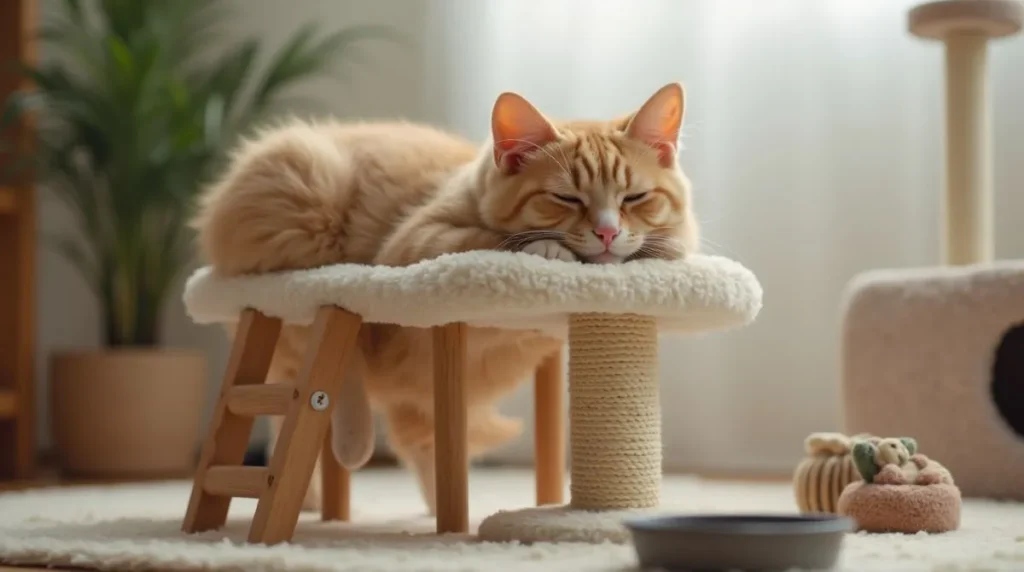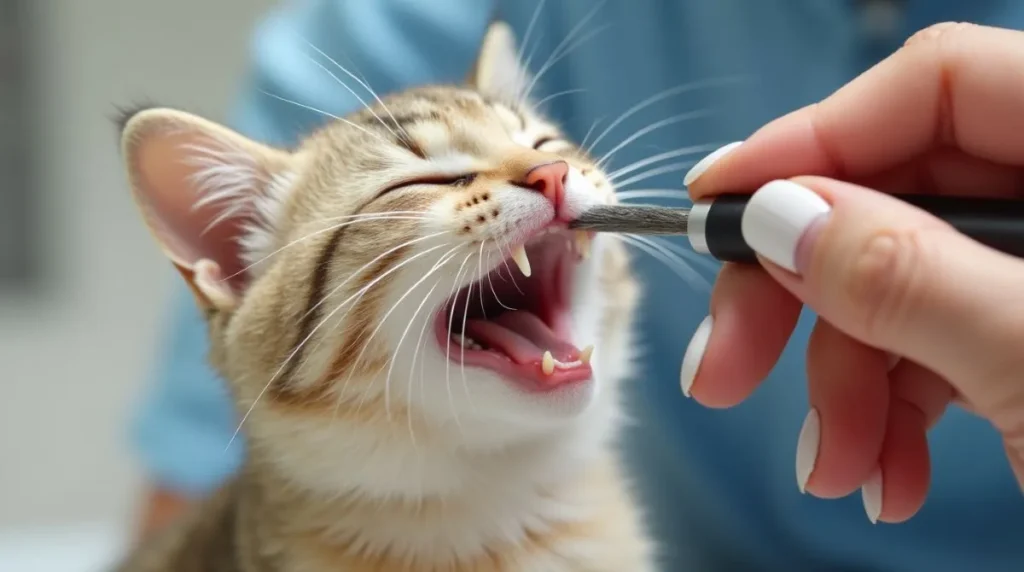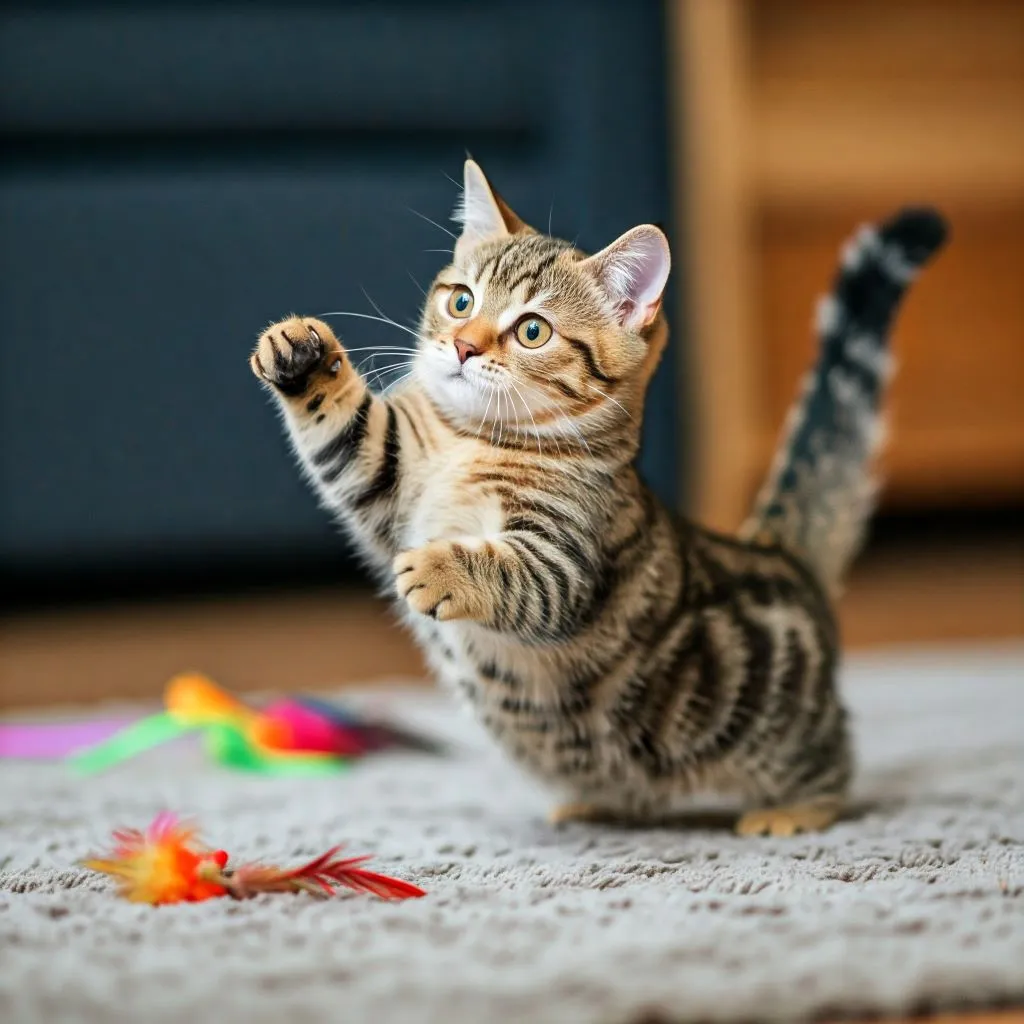Introduction
Munchkin cats, with their adorable short legs and playful personalities, have captured the hearts of cat lovers worldwide. This unique breed is known for its friendly demeanor and quirky charm, making them a popular choice for families and individuals alike. But as with any pet, potential owners often wonder about their health and how long they can expect their feline companion to live.
The life expectancy of Munchkin cats is a topic of interest and sometimes concern, given their distinctive physical traits. Generally, these cats have a lifespan similar to most domestic breeds, ranging from 12 to 15 years. However, factors like genetics, diet, lifestyle, and medical care can significantly influence their longevity.
In this blog post, we’ll explore the key facts about the lifespan of Munchkin cats, common health issues they may face, and practical tips to ensure they lead a long and happy life. Whether you’re a current Munchkin cat owner or considering adopting one, this guide will provide valuable insights into caring for these delightful companions.
Table of Contents
What Is the Average Life Expectancy of Munchkin Cats?
Typical Lifespan Range of Munchkin Cats (12–15 Years)
Lifespan of Munchkin cats usually have 12 to 15 years, which is similar to other common domestic cat breeds. Despite their unique appearance, particularly their short legs caused by a genetic mutation called achondroplasia, their overall health and longevity remain largely consistent with other cats. This range assumes that the cat receives proper care, including a balanced diet, regular veterinary checkups, and a safe living environment. However, as with any breed, individual cats may live shorter or longer depending on various factors, including genetics, lifestyle, and overall health.
Comparison With Other Cat Breeds
When comparing Munchkin cats to other breeds, their lifespan is quite typical. For instance, domestic shorthairs and mixed breeds often live between 12 and 16 years, while breeds like Siamese and Maine Coons may live slightly longer, averaging 15 to 20 years. On the other hand, some purebred cats, such as the Persian or Scottish Fold, may have shorter lifespans, often due to breed-specific health issues.
Munchkin cats lifespan is neither exceptionally long nor unusually short; however, their distinct physical traits sometimes lead to misconceptions about their health. Critics of the breed have raised concerns about potential complications from their shortened limbs, but responsible breeding practices and regular health monitoring can mitigate these risks. Ultimately, their longevity is comparable to most healthy, well-cared-for cats.
Factors That Influence Their Longevity
Several factors can influence the life expectancy of Munchkin cats, including genetics, environment, and quality of care:
- Genetics: The genetic mutation responsible for their short legs is generally not linked to life-threatening health conditions. However, improper breeding practices can lead to genetic complications. Cats from reputable breeders are less likely to inherit serious health problems, which can positively impact their lifespan.
- Diet and Nutrition: A well-balanced diet is essential for any cat’s health. Munchkin cats are prone to obesity, which can exacerbate joint problems and reduce their lifespan. Providing high-quality cat food, appropriate portion sizes, and access to fresh water can help maintain a healthy weight.
- Lifestyle: Indoor cats generally live longer than outdoor cats due to reduced exposure to hazards like predators, accidents, and diseases. Munchkin cats, with their limited jumping ability, are best suited to indoor environments where they can safely explore and play.
- Veterinary Care: Regular checkups, vaccinations, and preventative care are crucial for spotting and addressing health issues early. Conditions such as skeletal dysplasia, while rare, can affect some Munchkin cats and may require ongoing veterinary attention.
- Mental and Physical Stimulation: Enriching their environment with toys, scratching posts, and interactive play sessions helps keep Munchkin cats physically active and mentally engaged, contributing to their overall well-being and longevity.
By understanding these factors and providing the best possible care, Munchkin cat owners can ensure their furry companions lead long, happy lives. Although genetics play a role, a proactive approach to their health and well-being makes a significant difference in extending their lifespan.
Common Health Issues in Munchkin Cats
Overview of Genetic Conditions, Including Skeletal Dysplasia
Munchkin cats owe their unique, short-legged appearance to a genetic mutation that affects the development of their bones. This condition, known as skeletal dysplasia, is a form of dwarfism specific to this breed. While the mutation gives them their distinctive look, it can sometimes lead to skeletal and spinal issues. Most Munchkin cats lead healthy, normal lives, but some may experience problems such as lordosis (an excessive inward curvature of the spine) or pectus excavatum (a malformation of the chest). These conditions can vary in severity, with some cats showing no symptoms and others requiring medical attention.
Potential owners need to adopt Munchkin cats from reputable breeders who prioritize the health of the breed. Ethical breeding practices help minimize the risk of passing on severe genetic conditions. Breeders who focus on the overall well-being of their cats rather than solely on their appearance are crucial to ensuring a healthier future for Munchkin cats.
Other Potential Health Problems Like Obesity or Joint Issues
Munchkin cats are generally active and playful, but their shorter legs can make them more susceptible to joint issues over time. Conditions like arthritis may develop as they age, particularly if they are overweight. Obesity is a common health concern for Munchkin cats, as their shorter legs are not designed to support excessive weight. Carrying extra pounds puts additional strain on their joints, which can lead to mobility issues and discomfort.
To prevent obesity and related complications, it’s important to provide Munchkin cats with a balanced diet tailored to their activity level and age. Portion control, combined with regular exercise through play, helps maintain a healthy weight. Providing low platforms and ramps can also help reduce strain on their joints while allowing them to climb and explore safely.
Importance of Regular Veterinary Checkups
Regular veterinary care is critical for detecting and addressing health issues early in Munchkin cats. While the breed is generally healthy, they are not immune to the common ailments that can affect all cats. Routine checkups ensure that their weight, joints, and overall health are closely monitored. Additionally, vaccinations, dental care, and parasite prevention are essential components of maintaining their well-being.
Veterinarians can also screen for genetic conditions like skeletal dysplasia and recommend treatments or lifestyle adjustments if needed. For instance, if a Munchkin cat shows signs of spinal or joint problems, a vet may suggest physical therapy, medications, or dietary changes to manage the condition effectively. Early intervention can significantly improve the quality of life for cats with health challenges.
How Lifestyle Choices Affect a Munchkin Cat’s Lifespan
Indoor vs. Outdoor Living: Which Is Safer for Munchkin Cats?
The decision to keep a Munchkin cat indoors or allow them outdoor access has a significant impact on their lifespan. Indoor living is generally safer for all cats, and this is especially true for Munchkin cats. Their short legs, while endearing, can limit their mobility and ability to evade potential dangers in the outdoor environment. Munchkin cats may struggle to escape from predators, navigate uneven terrain, or avoid fast-moving vehicles, making outdoor living riskier for them.

Keeping a Munchkin cat indoors significantly reduces exposure to accidents, diseases, and parasites. Indoor cats are less likely to encounter feline leukemia, feline immunodeficiency virus (FIV), or external parasites such as ticks and fleas. Moreover, they avoid the physical hazards of the outdoors, like fights with other animals or consuming toxic plants. To ensure their safety, an enriched indoor environment with plenty of toys, scratching posts, and climbing platforms can mimic the stimulation they might find outdoors while keeping them safe.
Role of a Balanced Diet and Hydration
Proper nutrition and adequate hydration are essential for maintaining the health and extending the life of Munchkin cats. Their unique physique makes them prone to weight-related issues, so it’s important to monitor their food intake carefully. Feeding them high-quality cat food, rich in protein and low in carbohydrates, helps maintain a healthy weight and supports muscle development. Portion control is essential, as overfeeding can lead to obesity, which puts additional strain on their joints and can shorten their lifespan.
Hydration is equally important, as it aids digestion, prevents urinary tract issues, and supports overall health. Munchkin cats can sometimes be picky drinkers, so providing fresh water in multiple locations around the home can encourage them to stay hydrated. Consider using a water fountain, as the flowing water often appeals to cats and increases their water intake. Additionally, wet cat food can supplement their water consumption while providing essential nutrients.
Importance of Physical Activity and Mental Stimulation
Physical activity and mental stimulation play a vital role in keeping Munchkin cats healthy and extending their lifespan. While their short legs might limit their jumping ability, these cats are still energetic and playful. Regular exercise helps maintain a healthy weight, strengthens muscles, and prevents obesity-related health issues. Engaging them with toys, such as feather wands, balls, or interactive puzzles, keeps them physically active and mentally sharp.
Mental stimulation is just as important as physical activity for Munchkin cats. Providing puzzle feeders, catnip-filled toys, or rotating play activities prevents boredom and reduces stress, which can negatively impact their overall health. Scratching posts, window perches, and climbing structures tailored to their abilities offer further enrichment, allowing them to satisfy their natural instincts safely.
Incorporating consistent play sessions into their daily routine strengthens the bond between the cat and its owner while promoting a healthy and active lifestyle. Munchkin cats thrive when their environment supports both their physical and mental well-being, ensuring they remain happy, healthy, and full of life.
Tips to Extend the Life Expectancy of your Munchkin Cat
Providing Proper Nutrition Tailored to Their Needs
Nutrition plays a pivotal role in extending the life expectancy of Munchkin cats. Their unique physique, characterized by short legs, makes maintaining an ideal weight particularly important. Excess weight can put undue strain on their joints, increasing the risk of arthritis and other mobility issues. Feeding them high-quality cat food with the right balance of protein, fats, and essential nutrients ensures they remain active and healthy.
Portion control is essential to prevent overeating. It’s recommended to follow the feeding guidelines provided by the manufacturer or consult a veterinarian to determine the appropriate portion sizes based on their age, weight, and activity level. Including wet food in their diet can help maintain hydration while providing essential nutrients. Treats should be given sparingly to avoid excessive calorie intake.
In addition to regular meals, access to fresh, clean water is crucial. Dehydration can lead to urinary tract issues, which are common in cats. Consider using a pet water fountain to encourage them to drink more, as cats are often attracted to flowing water. Tailoring their diet and hydration routine to their specific needs helps support their overall health and longevity.
Regular Grooming and Dental Care

Regular grooming and dental care are vital for keeping Munchkin cats in optimal health. While their short coat generally requires minimal grooming, weekly brushing can help remove loose hair and reduce the risk of hairballs. Grooming is an excellent chance to inspect for potential skin problems, parasites, or any unusual signs that might need a vet’s attention.
Dental health is another critical aspect of care that directly impacts their overall well-being. Dental diseases, such as gingivitis and periodontal disease, can lead to pain, infection, and even systemic health problems if left untreated. To maintain good oral hygiene, owners should incorporate regular brushing using cat-safe toothpaste and toothbrushes. For cats resistant to brushing, dental treats or water additives designed to reduce plaque buildup can be effective alternatives. Annual veterinary dental cleanings can also help keep their teeth and gums healthy.
Trimming their nails every few weeks prevents overgrowth, which can lead to discomfort or difficulty walking. Grooming not only contributes to their physical health but also strengthens the bond between the cat and its owner.
Creating a Safe and Enriched Living Environment
A safe and enriched living environment is essential for promoting the health and happiness of Munchkin cats. Their shorter legs make them less agile than other breeds, so their surroundings should be designed to accommodate their unique physical capabilities. Providing ramps or low platforms allows them to climb and explore safely without putting stress on their joints.
Mental stimulation is equally important in extending their lifespan. Interactive toys, scratching posts, and puzzle feeders keep them mentally engaged and physically active, preventing boredom and reducing stress. Regular play sessions with their owner encourage exercise while fostering emotional well-being.
Safety measures, such as securing windows and keeping harmful plants or substances out of reach, further protect Munchkin cats from potential dangers. By creating a nurturing environment tailored to their needs, owners can ensure their Munchkin cats lead a long, healthy, and happy life.
Debunking Myths About Munchkin Cats Lifespan
Addressing Misconceptions About Their Short Legs and Health
One of the most common myths surrounding Munchkin cats is that their short legs significantly shorten their lifespan or lead to severe health issues. This misconception arises from the assumption that their genetic mutation, which causes their unique physical traits, also predisposes them to chronic or debilitating conditions. While Munchkin cats do have a higher likelihood of certain skeletal conditions, such as lordosis (a spinal curvature) and pectus excavatum (a chest deformity), these issues are not universal and occur in a small percentage of the breed.
In reality, most Munchkin cats live healthy, normal lives within the typical feline lifespan of 12–15 years, provided they receive proper care. Their short legs do not inherently cause mobility issues, and many Munchkin cats are as playful, agile, and active as their long-legged counterparts. The key to ensuring their health lies in understanding their physical limitations and providing an environment that minimizes unnecessary strain on their joints.
Highlighting the Role of Responsible Breeding
Another myth about Munchkin cats is that the breed is inherently unhealthy due to unethical breeding practices. While there have been instances of irresponsible breeders prioritizing appearance over health, ethical breeders focus on producing healthy cats by carefully selecting breeding pairs and avoiding inbreeding. Responsible breeding practices reduce the risk of passing on genetic conditions that could compromise the cats’ quality of life or lifespan.
Reputable breeders conduct health screenings for both parent cats to ensure they do not carry genes linked to severe skeletal or genetic disorders. They also prioritize the overall well-being of their cats by providing a healthy environment, proper nutrition, and regular veterinary care. For prospective Munchkin cat owners, choosing a kitten from a trusted breeder is one of the most effective ways to ensure their pet will lead a healthy, long life.
Furthermore, education and awareness about the breed have led to improved breeding standards and practices, allowing Munchkin cats to enjoy a future with fewer health concerns. When ethical breeding is prioritized, Munchkin cats can thrive like any other feline breed.
Real-Life Examples of Munchkin Cats Living Long, Healthy Lives
To further debunk the myths surrounding Munchkin cats lifespan, there are numerous real-life examples of these cats living long and fulfilling lives. Many Munchkin cat owners report their pets reaching the upper range of the average feline lifespan, with some even living beyond 15 years. These cases are a testament to the fact that with proper care, nutrition, and a safe environment, Munchkin cats can enjoy a quality of life on par with other breeds.
For instance, some owners share stories of their Munchkin cats maintaining their playful energy well into their senior years. These cats often form strong bonds with their families, showcasing not only their longevity but also their affectionate and sociable nature. Such examples dispel the notion that Munchkin cats are inherently frail or prone to premature aging.
By understanding the truth about their health and lifespan, and debunking the myths perpetuated by misinformation, Munchkin cat owners can focus on providing the love and care these adorable felines deserve. With responsible breeding and attentive ownership, these cats can lead happy, healthy, and long lives.
Conclusion about Life Expectancy of Munchkin Cats
In summary, the average lifespan of Munchkin cats is typically between 12 and 15 years, which is comparable to many other domestic breeds. While they may have some breed-specific health considerations, such as skeletal issues or a tendency to obesity, these can be effectively managed with proper care. Responsible breeding, a balanced diet, regular veterinary checkups, and a safe, enriched living environment are key factors that can help extend their lives and ensure they remain healthy and active. When given the right care and love, Munchkin cats can enjoy many years of happiness, affection, and companionship. If you’re a current or prospective Munchkin cat owner, feel free to share your own experiences or reach out to a veterinarian for personalized advice to ensure your feline friend thrives for many years to come.

